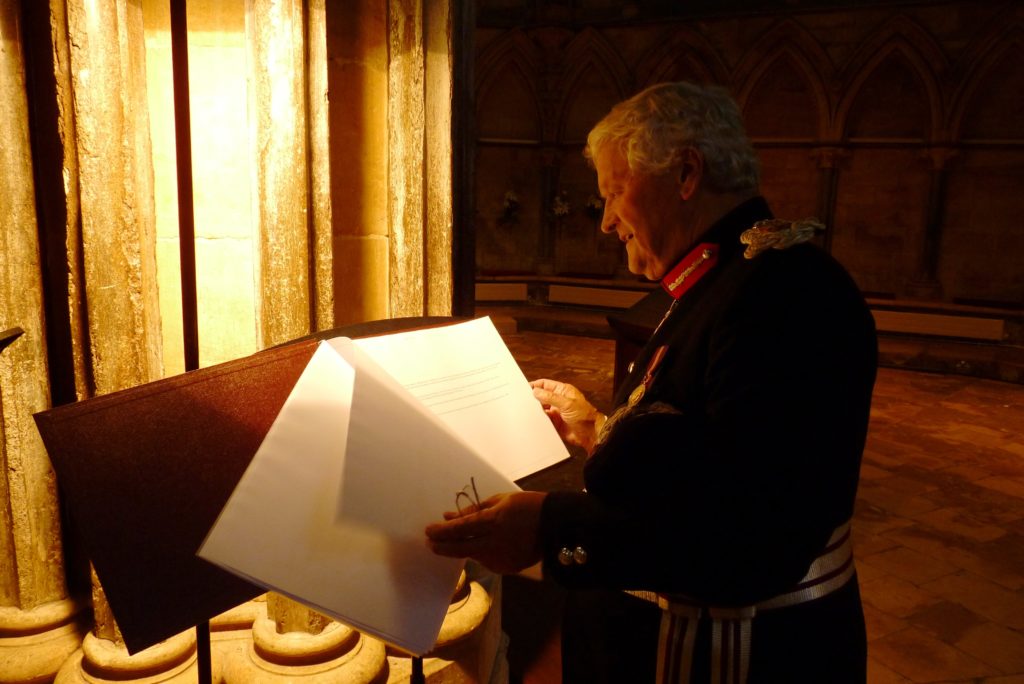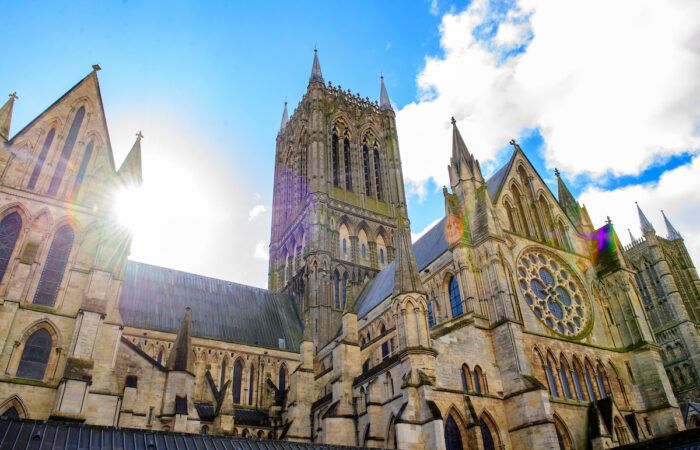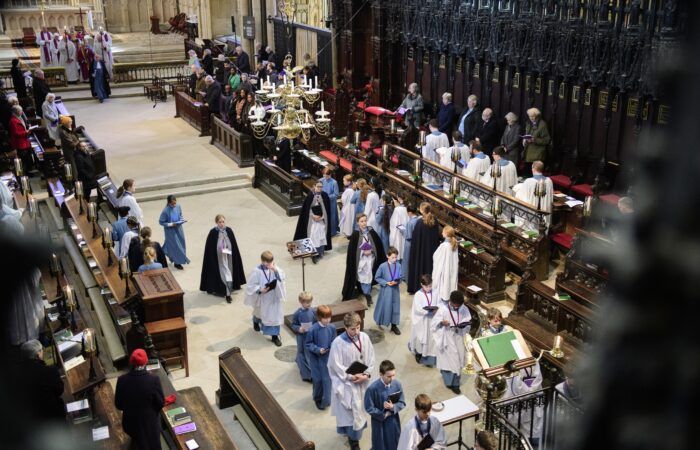A service has been held in Lincoln Cathedral to celebrate the life and work of Tony Worth CVO. The Bishop of Lincoln offered the following words of tribute during the service.
[separator]
In the name of God, Father, Son and Holy Spirit. Amen.
Tony loved this building and was never happier than sitting in his special place in St Hugh’s Choir as Lord Lieutenant or in the front row of the nave at a big service or concert. He served the Cathedral in many ways throughout his life; most recently, in the last three years, by chairing the Cathedral Council.
It is fitting, therefore, that we should gather here to commemorate his life and point towards Tony’s next journey – into eternity.
And it is also appropriate that we have a trio of deans who worked with Tony here today – Alec Knight, Philip Buckler and our current dean, Christine Wilson.
Prominently placed in Tony and Jenny’s home is a striking portrait of Tony in the uniform of a lord lieutenant. The background of the portrait evokes some of Tony’s interests: the Bomber Command Memorial and the Cathedral feature on the horizon, poppies carpet the ground on which he stands and a Second World War bomber flies overhead. More importantly for me the painting captures his character with his open and friendly face with a hint of that trademark twinkle in his eye.
And what has emerged for me from that portrait and from those conversations is that there were at least two dimensions to Tony’s character:
He was a man of stability and a man of adventure.
First, Tony was a man, who loved his family, his home, his way of life and this part of England. He loved his work and the rhythm of the agricultural year; the seasons of planting and tending; of harvesting and marketing and, as we have heard in relation to the family shoot, of shooting and eating.
At the heart of this life of stability was a marriage of over 50 years to Jenny. They were a perfect match. Initially when they met at Cambridge she was not impressed. Tony was ebullient and perhaps a little over-confident (Jenny may have even used the word ‘bumptious’ to me the other day) but Tony knew he had met the right person to share his life; he pursued and persuaded Jenny to return to England from the USA so that they could be married.
Together they built a close-knit and loving family of children and grandchildren and a wide circle of friends established and nurtured over many years. His family speak with affectionate, though realistic, love for him, recognizing the various aspects that made up his character. His friends speak of his loyalty and sense of fun.
Without those foundations, Tony would not have been the man we knew him be. Jenny supported Tony throughout their marriage but particularly during his time as High Sherriff and Lord Lieutenant not only censoring his speeches as we have heard, but driving him home from events (he, of course, always drove there) so that he could have a glass or two of wine – to be sociable, you understand.
For me this is a perfect arrangement but sadly, I have not yet been able to persuade my own wife to emulate Jenny’s excellent and self-sacrificial example – but there’s always hope.
Tony loved time with his family, be it at home or on holiday together in France. And that inner security of loving and knowing that you are loved meant he was comfortable in his skin; always a friendly and approachable person, not always politically correct (in fact, hardly ever politically correct!) He was able to exercise leadership and hold authority lightly and without side. He was equally at home visiting a youth club in Grimsby as drinking tea with the Royal Family at Buckingham Palace.
His work on his own farm, and in co-operation with neighbouring farmers and for the wider agricultural community of Lincolnshire, was professional and pioneering. He was president of the Agricultural Society, an energetic High Sherriff and a distinguished Lord Lieutenant of Lincolnshire, travelling up and down the historic county all during his tenure and welcoming Her Majesty and her family to the county.
So, Tony was a man of stability; rooted and earthed in the soil of Lincolnshire, but the second dimension I have discerned is that he was also a man of adventure who loved to explore and travel; in fact, his spirit of adventure was not limited to geographical journeys but he also had the ability and the temperament to think outside the box, to challenge received wisdom and to push the boundaries in all kinds of new directions.
Having persuaded Jenny to marry him they set off together on what Duncan described as a three-and-a-half-year honeymoon to Australia – a country with which he had some family connexions – where they drove across the continent and where he worked as an agricultural consultant, particularly with POM immigrants starting a new life there.
They returned to take up life at the family farm – enjoying the house and making it a centre for family and hospitality.
Being formed by the rhythms and cadences of the agricultural life he was always innovating and re-imagining new ways of running his business and working with colleagues to achieve the best possible outcome – not for his farm alone, but for his friends and neighbours locally and across the county as a whole.
Tony was one of the unifying leaders of Lincolnshire and his leadership ability was expressed most obviously through his profession as a farmer and his service to the agricultural community, but also in two major projects in which his contribution was decisive.
Back to that portrait: the Bomber Command Memorial on the top of Canwick Hill, which I see every day from my office window, would not have happened without Tony’s energy and commitment.
It is a memorial spire that stands over 100 feet tall: the UK’s tallest war memorial, to remember the 55,000 Bomber Command aircrew that lost their lives during the Second World War.
And that spire stands exactly opposite this Cathedral, reflecting the experience of many of those in Bomber Command who knew that when they sighted the cathedral they were almost home from their missions, and importantly for those who failed to return flying from Lincolnshire, providing their last view of home.
The grandson of an Air Chief Marshall, Tony was determined that this unacknowledged group of brave servicemen and women would be recognized and respectfully remembered.
The other area in which Tony made a decisive contribution was his part in the creation of the University of Lincoln.
In the summer of 2016 I attended a celebratory conversation of the key people who had founded the university – and Tony was there with the others telling the story of the creation of a new university in Lincoln which was described by the Independent newspaper as ‘the most important thing to happen to Lincoln since the Romans’.
That might be overstating it a bit (they have ignored the contribution of the Middle Ages) but clearly Tony and others played a significant part in building an excellent university that not only relates to the traditional areas of Lincolnshire life in which the county excels (agri-business and engineering) but also has had a meteoric rise up the league tables and established an international reputation.
I have spoken about Tony’s life being characterized by stability and adventure and that stability and adventure come together in the life of this Cathedral and what it points to.
Tony was a committed Christian all his life, expressed in loyal support for the local church in St Luke’s, Holbeach Hurn and here in the Cathedral and in countless quiet acts of kindness and hospitality.
One of Tony’s closest friends said that only recently he had confided to him, ‘with that lovely smile and a twinkle in his eye, “I have had a wonderful life on earth but am looking forward to going on to a better place.”’
Today, we thank God for Tony; for his commitment to his family; for his energy and imagination in his profession; for his loyalty to county and nation; for his friendship and comradeship; for his humour and sense of mischief.
We were enriched by Tony’s presence and we are diminished by his absence.
But I would say to Tony’s family that he lives on – not only because he is now in that better place of which he spoke, but also because he lives on in you and, for his children and grandchildren, in those genes you have inherited from him. For the wider community, Tony’s legacy will also live on in everything he achieved for Lincolnshire.
Let us thank God for Tony’s life and pray that he is now united with his creator and redeemer in that heavenly place to which he aspired.
May he rest in peace and rise in glory.


